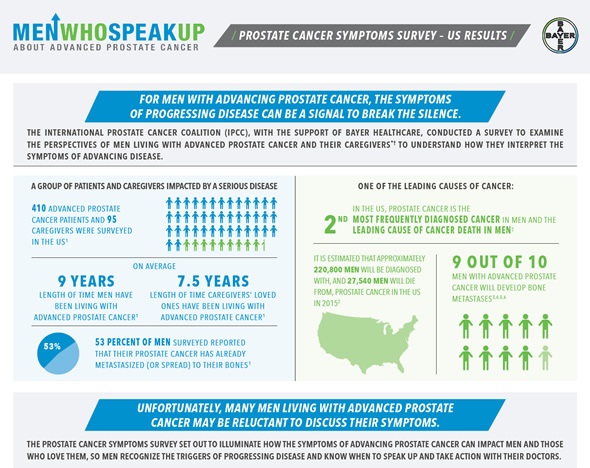What are the main symptoms of advanced prostate cancer?
The main symptoms of advanced prostate cancer can include (but are not limited to) difficulty walking or climbing steps, unexplained pain, troubled sleep and taking pain relievers daily.
Other signs of advanced prostate cancer can include problems passing urine, blood in the urine, erectile dysfunction, weakness or numbness in the legs or feet, loss of bladder control and tiredness that interrupts daily life.
I am not a doctor and I always encourage people to speak with their doctors and healthcare team about these and any other things they might be experiencing.
In the survey, conducted by the International Prostate Cancer Coalition (IPCC) and Bayer HealthCare, respondents reported the most common symptoms they experienced to be fatigue, pain or aches in specific areas, all over body pain or aches, numbness or weakness, difficulty sleeping as a result of pain, anxiety or distress as a result of pain and difficulty doing normal daily activities.

A recent Harris Poll survey showed that nearly 7 in 10 men sometimes ignore the symptoms of prostate cancer. What do you think are the main reasons for this?
That Harris Poll survey is the one commissioned by the IPCC, and I think there are a number of reasons why the majority of men living with advancing prostate cancer often ignore their symptoms.
In general, men are often reluctant to talk about these issues. It’s often difficult or uncomfortable for men. The survey found that 22 percent of men reported that talking about pain makes them feel weak.
Could you please outline the new educational initiative - Men Who Speak Up? What are the main aims of this movement?
The new Men Who Speak Up educational program is shaped by the U.S. survey results. It is a national campaign to raise awareness of symptoms of advancing prostate cancer and to help men talk to their doctors about what they are experiencing.
The website includes valuable resources and tips, including a doctor discussion guide to help men prepare before, during and after an appointment.
We also developed a downloadable symptoms tracker for men to record their symptoms between doctor visits. Men can then bring this with them to help facilitate the doctor-patient discussion.
What advice would you give to men on discussing prostate cancer with their doctor?
I would encourage men and their spouses, partners or loved ones to speak up and talk to their doctors. Open communication between the person with cancer and their entire healthcare team is essential.
What impact do you hope Men Who Speak Up will have?
The goal of the program is to raise awareness and help men talk to their doctors. My hope is that this will empower men to know that they aren’t alone in this, that they aren’t the only ones experiencing these issues and that they really need to talk to their doctors.
At what point should men see a healthcare professional if they spot the symptoms of advanced prostate cancer?
I am not a doctor, but men should see a doctor as soon as possible and report any and all symptoms.
What more needs to be done to improve the dialogue between men and their doctors?
As a Coalition, the IPCC aims to get this information and the tools we developed to the prostate cancer community. We are doing national outreach to spread the word and direct men and their families to our website.
Where can readers find more information?
Readers can visit the website to learn more about the survey, to access the tools and resources and to learn more about the IPCC member organizations.
About Brian Tomlinson, MPS, BSW
 Brian Tomlinson, MPA, BSW is the Chief Program and Communications Officer at CancerCare. Founded in 1944, CancerCare is the leading national organization providing professional support services and information to help people manage the emotional, practical and financial challenges of cancer. CancerCare services are provided by professional oncology social workers and are completely free of charge.
Brian Tomlinson, MPA, BSW is the Chief Program and Communications Officer at CancerCare. Founded in 1944, CancerCare is the leading national organization providing professional support services and information to help people manage the emotional, practical and financial challenges of cancer. CancerCare services are provided by professional oncology social workers and are completely free of charge.
In his role, Brian serves as part of the organization’s executive leadership team working to continuously enhance the value and scope of CancerCare’s mission. He directs all aspects of CancerCare’s counseling and support groups (available over the phone, online and in-person), educational workshops, publications and financial assistance programs. Mr. Tomlinson is also responsible for all aspects of public affairs, brand management and communications.
Prior to joining CancerCare in November 2013, he spent more than a decade at the Lymphoma Research Foundation where he served as member of the executive leadership team and was responsible for the development, execution and evaluation of the Foundation’s patient education, patient services and professional education programs, as well as the development and dissemination of disease-specific publications and online resources. Mr. Tomlinson holds a Masters degree in nonprofit management and public administration from Baruch College School of Public Affairs and Bachelor of Science in social work from Long Island University. He is a member of several professional societies including the Alliance for Continuing Education in the Health Professions, the American Association for Cancer Education, the American Society of Clinical Oncology, the Association of Oncology Social Workers and the National Association of Social Workers. Mr. Tomlinson also serves on the board of directors at the Lymphoma Coalition, which is a global network of lymphoma patient organizations from nearly 60 countries. He is a published author and experienced public speaker.
References
- Prostate Cancer Symptoms Survey: U.S. Results, 2015.
- American Cancer Society. “Prostate Cancer.” (Last revised: March 12, 2012). http://www.cancer.org/acs/groups/cid/documents/webcontent/003134-pdf.pdf. Accessed on April 6, 2015.
- Goh et al. New Multidisciplinary Prostate Bone Metastases Clinic: First of Its Kind in Canada. Current Oncology. Volume 14, Number 1.
- Tannock IF, et al. Docetaxel plus prednisone or mitoxantrone plus prednisone for advanced prostate cancer. N Engl J Med. 2004;351:1502-1512.
- Petrylak DP, et al. Docetaxel and estramustine compared with mitoxantrone and prednisone for advancedrefractory prostate cancer. N Engl J Med. 2004;351:1513-1520.
- Jin, Dayyani, and Gallick. Steps in Prostate Cancer Progression that Lead to Bone Metastasis. International Journal of Cancer. 2011.
The Metastatic Prostate Cancer Patient and Caregiver Study was conducted online and by telephone in the United States by Harris Poll on behalf of Bayer between February 12 and April 13, 2015, among men with metastatic prostate cancer (n=410) and adults who care for someone with metastatic prostate cancer (n=95†). Total sample data are not weighted and therefore representative only of the individuals interviewed.
*Caregivers refers to adults who care for someone with advanced prostate cancer.
†Small base (n<100). Results should be interpreted as directional in nature.